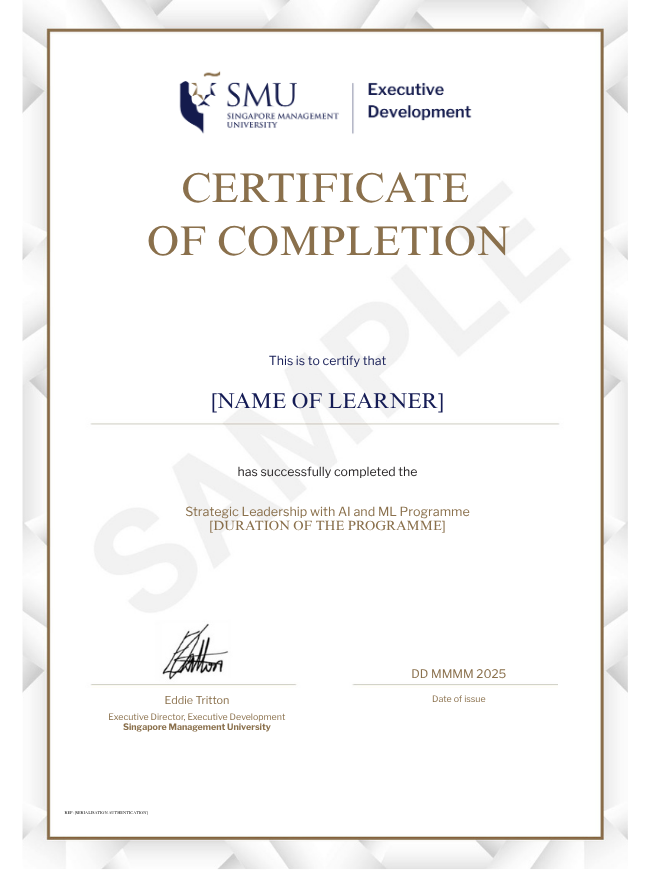
Strategic Leadership with AI and ML
Lead and revolutionize your business strategies with Artificial Intelligence applications. Integrated with Generative AI
The programme learning will begin from 31 Jan 2026 onwards and there will be a pause for holidays during Chinese New Year (16 Feb – 22 Feb 2026).
Future-Proof Your Career: Invest in Your Success
Emeritus and Singapore Management University unite to offer an exclusive opportunity. Enrol before Invalid liquid dataand get USD 100 enrolment benefit. Limited seats available. Reserve your spot today!
Why Enrol in Strategic Leadership with AI and ML Programme?
The innovations of digital technology continue to transform industries. Of these innovations, artificial intelligence (AI) has made a significant impact on the way businesses operate. In the Strategic Leadership with AI and ML programme, offered by Singapore Management University, you will explore how to apply the latest AI methodologies to lead digital transformation within your organisation while upscaling your business skillset—no coding experience is required. The programme is designed to expand your understanding of AI and teaches the methodologies used for applying it to business scenarios and strategies and build your leadership credibility.
Who Is This Programme For?
The programme is designed for professionals who aspire to learn more and expand their knowledge of AI and its applications in business scenarios and strategies. Representative industries and roles that can benefit include:
Senior Professionals
Experienced decision-makers aiming to establish or expand businesses or products focused on AI and ML. Seasoned executives and advisors seeking to expand the implementation of AI and ML to capitalize on AI-driven prospects.
Functional Leaders and Managers
Leaders and Managers in various functional domains, including marketing, finance, and other operational sectors, eager to integrate AI technologies into their business operations for improved efficiency and actively contributing to the promotion of innovation.
Technical Professionals
IT and technical experts looking to learn AI integration, frameworks for incorporating AI for organizational change, and Generative AI Applications, to enhance their skill set.
What Will This Programme Do For You?
Survey AI technologies and their uses across sectors and functions
Identify opportunities within a business to implement AI for better performance
Recognise the purpose of ethics and challenges in industry applications
Explain the steps to build and deploy AI solutions for business/sector
Examine the AI-specific privacy regulations in law
Create an executive summary of an AI implementation/improvement plan for a business
Programme Highlights

115+ video lectures

40+ Industry Examples

15+ Assignments

8 Discussion Boards

Real world case studies and examples

Modules on gen AI including applications and tools like Chat GPT and Google Gemini

Live office hour sessions and personalized support from Industry Leaders
Programme Faculty

Associate Professor of Marketing
Sandeep serves as Associate Professor of Marketing. Prior to joining SMU, Prof Sandeep worked at Indiana University's Kelley School of Business and was a 3M Jr faculty fellow ...

Associate Professor of Computer Science; Director, BSc (Computer Science) Programme; Lee Kong Chian Fellow
Dr Hady W. Lauw is an Associate Professor of Computer Science in the School of Computing Information Systems, where he teaches Data Structures and Algorithms, Recommender Syst...

Assistant Professor of Computer Science Education; Director, MITB Artificial Intelligence Programme
Assistant Professor Dai Bing Tian has held various academic appointments at SMU since 2010, including as a Research Engineer, Fellow and Scientist. Currently, he serves as the...

Professor of Law
Professor Gary Chan has been a faculty member at Singapore Management University for close to two decades, teaching courses on Ethics and Social Responsibility, Law of Torts, ...

Associate Professor of Law; Deputy Director, Centre for AI and Data Governance
Associate Professor of Law Warren Chik is the Deputy Director of the Centre for AI and Data Governance. He teaches courses on Business Law, Entertainment Law, Information Tech...
Programme Modules
The programme comprises 8 modules. Each module is led by an SMU faculty expert with field experience specific to the AI/ML topics being discussed.
Bonus Modules
Masterclass to address cutting-edge tools and latest developments
Testimonials




Past participants profile

Past participants of Emeritus work at

Note: All brand, product and company names are trademarks™ or registered® trademarks of their respective holders. Use of them does not imply any affiliation with, endorsement by, or association of any kind between them and programme owners.

Programme Completion Certificate
Upon successful completion of the programme, participants will be awarded a verified digital certificate by Singapore Management University.
Note: All certificate images are for illustrative purposes only and may be subject to change at the discretion of Singapore Management University.
FAQs
Early registrations are encouraged. Seats fill up quickly!
Flexible payment options available.
Starts On












